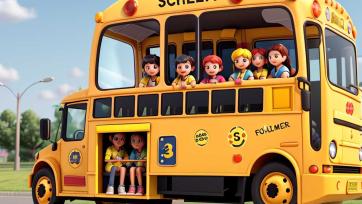Lyrics of popular children's songs

Wheels on the Bus Song Lyrics
"The Wheels on the Bus" is a traditional American folk song that has been a staple in early childhood education for decades. Its origins, like many folk songs, are somewhat murky, but its repetitive and interactive nature has made it a favorite among children and educators alike.
The song is believed to have been written in the United States in the mid-20th century. Its tune is based on a traditional British song called "Here We Go Round the Mulberry Bush, " which has a similar repetitive structure and melody. The transformation from a song about a mulberry bush to one about a bus is a testament to the adaptability of folk music to modern contexts.
"The Wheels on the Bus" is not just a song; it's also an activity. As children sing about the bus's wheels going "round and round" or the wipers going "swish swish swish, " they often mimic the actions with hand movements or full-body motions, turning the song into a lively participatory experience.
Over the years, the song has been adapted and expanded upon, with countless verses being added to describe various actions on the bus, from the horn honking to the children chatting. Its universal theme of a bus journey and its catchy, repetitive melody have made "The Wheels on the Bus" a beloved song in many countries, transcending cultural and linguistic barriers.
In summary, "The Wheels on the Bus" is a relatively modern addition to the canon of traditional children's songs, but its widespread popularity and adaptability have ensured its place as a timeless classic in children's music.
The Wheels on the Bus Lyrics
The wheels on the bus go round and roundRound and round, round and roundThe wheels on the bus go round and roundAll through the townThe wipers on the bus go Swish, swish, swish,Swish, swish, swish, swish, swish, swishThe wipers on the bus go Swish, swish, swishAll through the town.The people on the bus go, chat, chat, chat,cha, , chat chat, chat chat , chatThe people on the bus go, , chat, chat, chatAll through the town.The horn on the bus go Beep, beep, beepBeep, beep, beep, beep, beep, beepThe horn on the bus go Beep, beep, beepAll through the town.The baby on the bus go, wah, wah, wah!wah, wah, wah, wah, wah, wah!The baby on the bus go, wah, wah, wah!All through the town.The mummy on the bus go, ssss sh, ssss sh, ssss sh,ssss sh, ssss sh, ssss shThe mummy on the bus go, ssss sh, ssss sh, ssss shAll through the town.The wheels on the bus go round and roundRound and round, round and roundThe wheels on the bus go round and roundAll through the town.